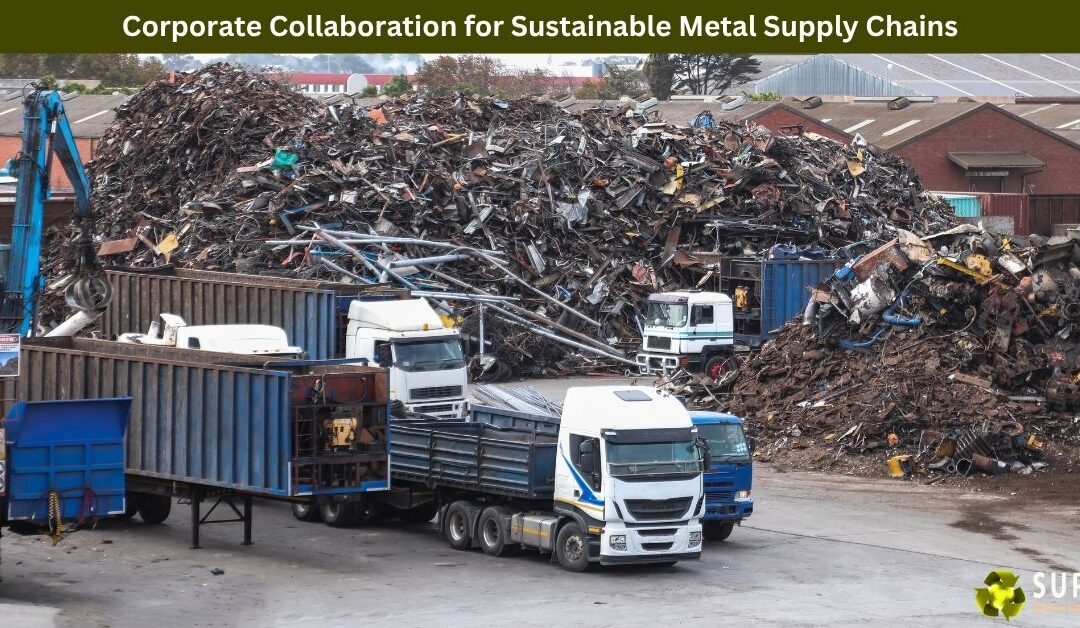When it comes to building a more sustainable future, no company can go it alone — especially in the metals industry. From mining and manufacturing to recycling and reusing, the metal supply chain is complex, global, and deeply interconnected. That’s why collaboration between businesses — across sectors and borders — is one of the most powerful tools we have for making real environmental progress.
Let’s take a closer look at how corporate partnerships are reshaping the way we think about sustainability in the metal supply chain.
Why Collaboration Matters in the Metal Industry
The supply chain for metals isn’t linear — it’s a loop. And to make that loop truly circular, companies need to work together at every stage: extraction, processing, production, distribution, consumption, and recycling.
Here’s where collaboration makes a real difference:
- Sourcing responsibly: Mining companies are teaming up with manufacturers to ensure metals are extracted with minimal environmental harm and better working conditions.
- Reducing carbon emissions: Steel and aluminium producers are sharing technologies to lower emissions during smelting and refining.
- Improving recyclability: Product designers and recyclers are collaborating to ensure metals in consumer products can be recovered efficiently at end-of-life.
- Creating closed-loop systems: Brands are working with recycling facilities to recover scrap metal from used products and reintegrate it into new ones.
It’s no longer about isolated efforts — it’s about joined-up thinking.
Real-World Example: Automotive Industry Partnerships
Take the automotive industry as an example. Carmakers like BMW, Ford, and Volvo are investing heavily in sustainable metal sourcing, partnering with suppliers who use low-carbon aluminium and recycled steel. In some cases, they’re working directly with metal recyclers to reclaim metals from end-of-life vehicles and feed them back into production.
This not only helps reduce emissions, but also ensures supply chain transparency — something consumers are increasingly demanding.
And it’s not just the big names doing this. Smaller suppliers and recyclers are forming alliances to meet stricter sustainability targets, creating a ripple effect throughout the entire chain.
Tech-Driven Collaboration
Another exciting area of collaboration is technology. Companies are sharing data and innovations to make the metal supply chain more efficient and traceable.
For instance, blockchain is being used to track metals from their source all the way through to the final product, ensuring ethical sourcing and reducing fraud. Cloud platforms are helping companies exchange information about emissions, material origin, and recyclability. These tools allow businesses to work together in real-time — and with greater accountability.
It’s all about transparency and trust.
Local Initiatives in Australia
Closer to home, we’re seeing some great examples of corporate collaboration here in Australia. A growing number of manufacturers, construction firms, and recyclers are joining industry networks that promote metal sustainability. These partnerships aim to reduce waste, increase recycled content in products, and improve collection systems.
At Super Metal Recycling, we’ve worked with several local businesses to develop more efficient scrap metal recovery processes. By sharing logistics, sorting techniques, and transportation solutions, we’ve been able to reduce both costs and environmental impact. It’s a win for us, a win for our partners, and a win for the planet.
What Makes Collaboration Work?
Effective collaboration doesn’t happen by accident. It takes:
- Clear goals: Partners need a shared vision, whether that’s reducing emissions, increasing recycled content, or achieving circularity.
- Open communication: Information has to flow easily between parties — including suppliers, manufacturers, recyclers, and logistics providers.
- Long-term commitment: Sustainable change doesn’t happen overnight. Partnerships must be built on trust and a willingness to evolve together.
- Incentives and standards: Industry standards (like ISO 14001 or ASI certifications) and government incentives help align companies around best practices.
Moving Toward a Circular Metal Economy
The ultimate goal of these partnerships? A fully circular metal economy — where products are designed for durability and recyclability, waste is minimised, and materials are continuously reused.
But no one company can build that system on its own. It takes a network of collaborators, each doing their part, each sharing knowledge, and each holding the other accountable.
We’re starting to see that happen more and more. Whether it’s construction firms working with metal recyclers to recover structural steel, or electronics companies designing products that are easier to dismantle and recycle — collaboration is what keeps the cycle going.
A Quick Word Before You Go
At the end of the day, sustainable supply chains aren’t just about green branding or ticking a box. They’re about building resilient systems that protect the environment, reduce reliance on raw materials, and make good business sense.
Here at Super Metal Recycling, we believe in the power of partnerships. We’ve seen firsthand how collaboration can drive innovation, efficiency, and real change. Whether you’re a manufacturer looking to reduce your environmental impact or a business wanting to better manage your metal waste — let’s talk.
Because when companies work together, real progress isn’t just possible — it’s inevitable.
If you are in Boronia, and looking for a metal recycling service, this is the best way to visit us.
Super Metal Recycling
345 Frankston – Dandenong Road, Dandenong South VIC 3175
(03) 9706 4909


Recent Comments